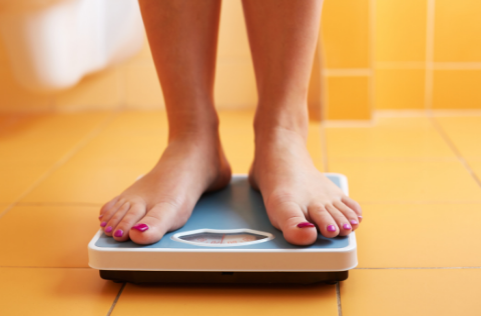So you want to become an intuitive eater, but if you’re being honest, still kind of want to lose weight.
This is so understandable.
The society we all live in teaches us to believe that thinness is a virtue. Doctors go to medical schools that are instilled with decades worth of diet culture and fatphobia, teaching them to prescribe weight loss as a form of preventative health care. Body diversity is not celebrated the way that weight loss is. Often, any weight loss is praised and complemented even if it was the result of poor mental health or illness.
Weight loss almost feels like something you have to want, or else you risk looking like someone of poor moral virtue, who doesn’t care about their health or wellbeing.
The great majority of clients come to our doors still wanting to lose weight, and sometimes this is because they simply don’t know there are other ways to define health-oriented goals.
The way we see it, there is a big difference between wanting to lose weight, and actively pursuing weight loss.
Intuitive eating is like learning a new language. If you’ve grown up speaking one language your whole life (i.e., living in pursuit of the thin ideal), you can’t wake up one day and simply decide to be fluent in another one (i.e., at peace with your body regardless of its size).

What is Intuitive Eating?
To better understand why pursuing intentional weight loss can’t support your ability to be an intuitive eater, let’s recap the principles of intuitive eating.
First and foremost, intuitive eating rejects the diet mentality. The diet mentality is the way of thinking that centers around shrinking and controlling your body through your food and movement choices.
Living with a diet mentality, your days, weeks and months are boiled down into concerns around how your body looks. You might rely on numbers, a plan, lists of “good” or “bad” foods and other external rules to dictate how you eat rather than be guided by your own body’s innate communication signals. Diet mentality teaches you to distrust your body, while intuitive eating is all about learning how to tune back in.
The other principles of intuitive eating are
- Honor Your Hunger
- Make Peace with Food
- Challenge your Food Police
- Discover the Satisfaction Factor
- Feel your Fullness
- Cope with Emotions Using Kindness
- Respect Your Body
- Movement - Feel the Difference
- Honor your Health with Gentle Nutrition
All of the principles of intuitive eating center around building internal awareness to help you listen to what your body needs and take care of it from a place of compassion rather than manipulation.

how does focusing on weight loss impact intuitive eating?
Focusing on weight loss acts as a barrier in the communication pathway between your body and your behavior.
When weight loss is your goal, the decisions you make around eating center on calories, portion sizes, restricting foods and becoming smaller – not what your body really needs or what would satisfy you. This is diet culture’s play.
You disconnect from your body cues, start to make decisions that aren’t in true alignment with your values, and then feel guilty and ashamed whenever you aren’t able to follow through with diet culture’s ideals.
It promotes disconnection from body cues
When you’re pursuing intentional weight loss, what happens when you feel hungry shortly after a meal? Or when you feel too tired to work out even though you planned on going to an exercise class after work?
To build trust and intuition with your body, you need to actively listen to what it’s asking for. In general, intentional weight loss requires you to disconnect from your body’s cues and override them with force and willpower. This is anything but intuitive.
it may create unsustainable changes
The force and willpower required to induce weight loss when it’s your goal is unsustainable for most people. Your body (thankfully) comes with survival mechanisms that kick into play when it isn’t getting what it needs because of a diet.
One of these things is primal, out-of-control or binge eating that happens after a period of restriction or dieting. Many people who limit their carbohydrate or overall calorie intake also experience intense cravings for sugary, sweet foods. This is one way your body is guiding you to get what it’s been missing. Your body also has built-in mechanisms to resist future weight loss (which your body interprets as a threat to survival), making each following weight loss attempt more difficult.
When it comes to your biology, you can’t “hack” it forever.
it can increase your inner critic
Even if you feel comfortable ignoring your body’s cues in favor of following the rules of a diet, you may not feel comfortable in your skin.
Pursuing weight loss is living your life with the expectation that your body will become smaller. It can increase your preoccupation with your body shape, your reflection, and your concern over how others are perceiving you.
If you are unhappy with the way your body looks, or are disappointed by a lack of weight loss, your inner critic may flare up and encourage you to engage in harmful behaviors (skipping a meal, engaging in compensatory exercise, isolating from friends and family, etc.).
The way you speak to yourself matters and can have a direct impact on your self care choices and your health. Rather than fostering a critical inner voice, intuitive eating emphasizes nurturing one of compassion and curiosity. This allows you to learn about what works, and what doesn’t work, for YOU without any expectation, guilt, or shame attached.

What to do if you still desire weight loss with Intuitive eating
If you’ve made it this far and are still wondering if it is possible to eat intuitively and lose weight, that’s okay. It can take a lot of time to sort through your feelings around weight loss and ultimately call a truce with your body.
There is space here for you to hold your desire for weight loss as you explore intuitive eating and consider letting go of your goal of chasing a smaller body.
In pursuing intuitive eating, we simply ask that you challenge yourself to resist the active pursuit of weight loss so that you can practice listening to and honoring your body’s needs.
Very few people decide that overnight they are done with weight loss after engaging in weight loss attempts for years or decades.
You can be done with dieting and still want to lose weight.
You can want to heal your relationship with food and wish you had a smaller body.
You have time to let go of the desire to be thin.
The key, though, is that a fully healed relationship with food through intuitive eating cannot happen without letting go of the thin ideal and the diet mentality that keeps you focused on weight loss.
If you are working on letting go of the pursuit of weight loss during your intuitive eating journey, we have a few suggestions below.
give yourself grace
Going against diet culture is HARD, hard work, my friends.
Even those who have been on an intuitive eating journey for months or years, who have let go of dieting for good and are enjoying the freedom of intuitive eating, can stumble and experience poor body image and experience a desire for weight loss.
We still live in diet culture, and it’s still all around us. It is so easy to fall for the trap that pursuing weight loss is what you need to be happier or healthier.
Give yourself grace in this process, and know that simply resisting the urge to diet is a major step towards intuitive eating.
reflect on intention of desired weight loss
Something we work with almost all of our clients who present to us with a desire for weight loss is digging deeper into this goal.
Here are a few journal prompts you might explore yourself in a quiet moment:
- What do you feel that weight loss will bring you?
- How has attempting intentional weight loss impacted you in the past?
- Has dieting or focusing on your weight and appearance helped you live a truer, more meaningful life? Or has it led you further away from yourself?
- What made you want to seek out Intuitive Eating and a more peaceful relationship with food?
talk it out!
There is a reason you find yourself wanting to lose weight and finding it hard to let go of that desire. And that reason is uniquely yours.
Reflecting, journaling, and talking it out with a HAES-aligned, intuitive eating informed dietitian (like us at NourishRX!) can help you connect the dots you need to make peace with your body AND food.
We’re here for you at NourishRX whether you are still wondering whether you should try intuitive eating or whether you are far along in your journey but still struggling with the desire to lose weight.
For a low-pressure way to be introduced to more of the principles of intuitive eating, join our Jumpstart to Intuitive Eating Course. The on-demand course comes packed with short videos and plenty of space to reflect on how diet culture has impacted you. This is a great first step in your journey to intuitive eating, and it’s ready whenever you are. If you’re interested in getting individual support and talking things out with one of our intuitive eating dietitians, we are here to help. Book your coordination call today!
Comments Off on Can I Lose Weight with Intuitive Eating?